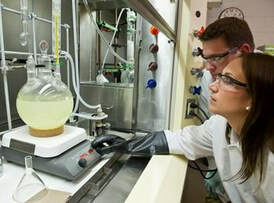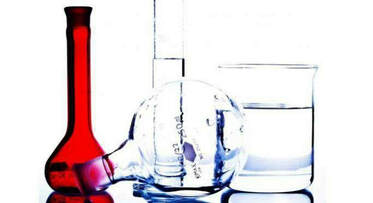Chemistry
Chemistry

Why Study Chemistry?
What do chemists do?
Chemists conduct experiments to study how elements work in different conditions, test how they mix, and work out what they are made up of right down to the tiniest particle.
The results can be groundbreaking, colourful, explosive, or almost impossible to see.
Chemists use their experiments and knowledge to develop medicines, foods, fabrics and other materials, from neon lights to shatterproof glass.
They also use it to understand the world around us, from why leaves change colour to discovering invisible pollutants in the air.
'Chemists get to do some seriously cool stuff – and it's all part of the job!'
What do chemists do?
Chemists conduct experiments to study how elements work in different conditions, test how they mix, and work out what they are made up of right down to the tiniest particle.
The results can be groundbreaking, colourful, explosive, or almost impossible to see.
Chemists use their experiments and knowledge to develop medicines, foods, fabrics and other materials, from neon lights to shatterproof glass.
They also use it to understand the world around us, from why leaves change colour to discovering invisible pollutants in the air.
'Chemists get to do some seriously cool stuff – and it's all part of the job!'

Chemistry is everywhere!
Pick up a can of soft drink and you’ll find chemistry everywhere, from the metal can you’re holding, to the paint used to cover it and the liquid inside.
Just breathe in and out and you’re performing a chemical reaction, which is a little scary, but pretty great too…
Chemistry is sometimes known as the "central science" because it helps to connect physical sciences, like maths and physics , with applied sciences, like biology, medicine and engineering.
What skills will I get from studying chemistry?
All that questioning and experimentation can be really handy when it comes to building a whole range of skills for work.
Chemistry helps you to develop research , problem solving and analytical skills. It helps to you challenge ideas and show how you worked things out through logic and step-by-step reasoning. Chemistry often require teamwork and communication skills too.
Career opportunities: http://www.rsc.org/careers/future/your-future-chemistry
SQA : https://www.sqa.org.uk/sqa/45720.html
Pick up a can of soft drink and you’ll find chemistry everywhere, from the metal can you’re holding, to the paint used to cover it and the liquid inside.
Just breathe in and out and you’re performing a chemical reaction, which is a little scary, but pretty great too…
Chemistry is sometimes known as the "central science" because it helps to connect physical sciences, like maths and physics , with applied sciences, like biology, medicine and engineering.
What skills will I get from studying chemistry?
All that questioning and experimentation can be really handy when it comes to building a whole range of skills for work.
Chemistry helps you to develop research , problem solving and analytical skills. It helps to you challenge ideas and show how you worked things out through logic and step-by-step reasoning. Chemistry often require teamwork and communication skills too.
Career opportunities: http://www.rsc.org/careers/future/your-future-chemistry
SQA : https://www.sqa.org.uk/sqa/45720.html
Watch the Chemistry Promo Video











